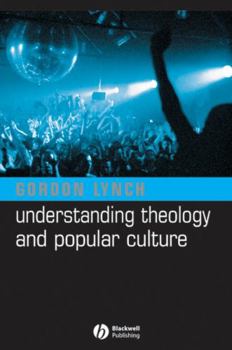Undestanding Theology Culture
Select Format
Select Condition 
Book Overview
Understanding Theology and Popular Culture is one of the first books to give an overview of the key issues and methods in this field of study.
Format:Paperback
Language:English
ISBN:1405117486
ISBN13:9781405117487
Release Date:January 2005
Publisher:Wiley-Blackwell
Length:256 Pages
Weight:0.85 lbs.
Dimensions:0.8" x 6.0" x 9.0"
Customer Reviews
2 ratings
An Excellent Introduction to Theology and Popular Culture
Published by Thriftbooks.com User , 16 years ago
This is a preferred book on theology and popular culture. Gordon Lynch gives a fair account of the relevant issues, well written and concise. He notes how media and technology relates to capitalism and social organization, and he is cautious of the danger of putting too much explanatory weight on technology and media. He reviews theories on the proper Christian engagement with culture as well as interpretive approaches to media. He also affirms the need to be critical of how technology and media sustain oppressive systems and distorts values. Hence Lynch brings in view a healthy interdisciplinary awareness involved in understanding the integration of theology and popular culture. To get a sense of the author's perspective, he prefers what he refers to as the revised conversational model, which "envisions theology as a mutual critical dialogue between interpretations of the Christian message and interpretations of contemporary cultural experiences and practices."(130) This method is preferred because "it recognizes that truth and goodness are not the sole positions of one particular religious tradition or world-view."(105) Then he states that his model needs to be informed by another model called the praxis model. "What distinguishes the praxis model...is its commitment to critiquing religious and cultural beliefs on the basis of their promotion of liberation and well being."(104) This model "is invaluable in reminding us that appropriate theological reflection should ultimately inspire ways of living and acting that are liberating and transformative."(106) If you have to read only one book on theology and popular culture, I would recommend this one as having a nice balance of perspective. However no book is comprehensive and I would encourage other resources. Other authors on the subject, include Kelton Cobb, Detweiler & Taylor, Shane Hipps, Robert Johnston, and William Romanski. Also some articles in the Routledge Companion to Postmodernism (Such as "Postmodernism and Popular Culture) are helpful.
A Creative and Helpful Overview of the Field
Published by Thriftbooks.com User , 19 years ago
Many theologians write about "popular culture," either directly or indirectly, but theology has been lacking a text that would help situate the larger field of studies in religion and popular culture. Lynch has written such a text: a map for theologians interested in the contemporary debates, as well as a proposal for a theological development of the key questions. This book makes some very important contributions: foregrounding the importance of theological debates in the correlational tradition for pop culture/theology work; holding out the dignity of the experimental moment in which the "field" finds itself, mirrored in the trifecta of readings of pop culture artifacts in the latter part of the book; introducing the significance of judgment for pop culture/theology work; and strongly joining theological analysis of pop culture to the problematic of the everyday. That's a lot of boulders moved forward in about 200 pages. I have some questions about whether and how the problem of "normativity" is the best way to describe the ethical impasse Lynch narrates in the field today. Still, this is an excellent book for helping theologians catch up to where the current debates are, or as a text for students to help them see how a seemingly simple task--asking how God and culture relate--is so complicated. Tom Beaudoin Santa Clara University






